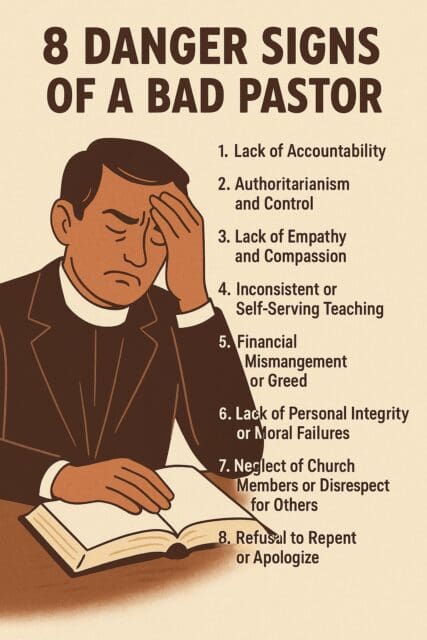Most pastors genuinely love their people. They serve hard, carry heavy burdens, and try to shepherd well. But some leaders slip into patterns that damage trust, fracture communities, and keep churches living under fear instead of freedom.
Spotting these patterns early protects both the church and the people inside it. Here are the danger signs that a pastor’s leadership might be drifting into unhealthy territory.
8 Danger Signs of a Bad Pastor
1. They Don’t Answer to Anyone
If a pastor refuses oversight, avoids boards or mentors, or treats questions like threats, that’s a problem.
Good leaders welcome guardrails. Bad ones remove them.
Accountability keeps decisions wise, finances clean, and power in check. Without it, isolation grows, and so do abuses.
2. Everything Has To Go Through Them
A healthy pastor leads; an unhealthy pastor controls.
Watch for urgency, pressure, and guilt: “If you question this, you’re not loyal.” “If you disagree, you’re out of alignment.”
Manipulation disguised as “spiritual authority” is one of the clearest signs something is off.
3. They Don’t Really Care About People
You can hear it in their tone and feel it in the room.
Hard conversations get brushed off. Hurting people get ignored. Counseling feels rushed. Empathy is missing.
When the pastor’s comfort matters more than people’s wounds, the church becomes a stage instead of a family.
4. Their Teaching Slowly Starts to Center…Them
Bad pastors often use Scripture selectively:
• to defend their decisions
• to justify control
• to shut down dissent
• to elevate their image
If sermons become self-referential or avoid anything challenging, that’s a red flag.
5. Money Gets Weird
Money reveals motives.
Signs of trouble include:
• pressure to give “more than before”
• guilt-driven giving
• lack of financial transparency
• a lifestyle that outpaces the congregation
Stewardship isn’t glamorous, but it’s one of the clearest tests of integrity.
6. Their Private Life Doesn’t Match Their Public Life
No pastor is perfect, but patterns matter.
Repeated dishonesty, secretive behavior, moral failure, or addictions that are ignored rather than addressed—these erode trust at the core.
When a leader refuses to deal with their issues, the whole church pays the price.


